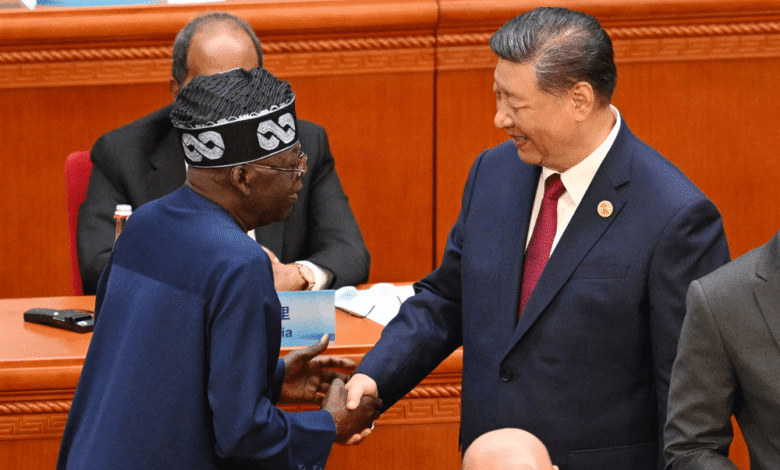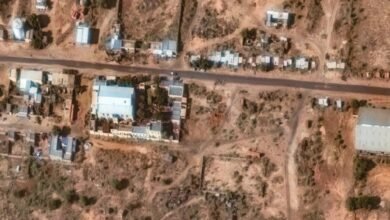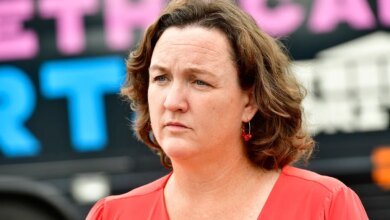China Counters Trump’s Nigeria Threats

After US President Donald Trump threatened military action against Nigeria over the alleged persecution of Christians by Islamist rebels, China intervened to oppose Trump’s actions, deepening the rivalry between Washington and Beijing for the loyalty of Africa’s most populous country.
“China, as Nigeria’s comprehensive strategic partner, firmly opposes any country that uses religion and human rights as an excuse to interfere in the internal affairs of other countries, and threatens other countries with sanctions and the use of force,” Chinese Foreign Ministry spokesman Mao Ning said on November 4.
After US President Donald Trump threatened military action against Nigeria over the alleged persecution of Christians by Islamist rebels, China intervened to oppose Trump’s actions, deepening the rivalry between Washington and Beijing for the loyalty of Africa’s most populous country.
“China, as Nigeria’s comprehensive strategic partner, firmly opposes any country that uses religion and human rights as an excuse to interfere in the internal affairs of other countries, and threatens other countries with sanctions and the use of force,” Chinese Foreign Ministry spokesman Mao Ning said on November 4.
In a tweet on X (formerly Twitter) the same week, Yu Dunhai, the Chinese ambassador to Nigeria, wrote that “China is ready to continue to support Nigeria in fighting terrorism and maintaining internal stability.”
There has been a dispute between Washington and Beijing since Trump returned to power in January. Despite the recent meeting between Chinese President Xi Jinping and Trump, tensions still persist, and Nigerians fear they are just a piece on the chessboard.
“China sees the ongoing conflict as an opportunity to flaunt its supposed good intentions of non-interference and portray the United States as a bully who wants to interfere in countries’ internal affairs, where Beijing claims, by contrast, to respect African sovereignty and want to do business,” said James Barnett, a non-resident fellow at the Washington-based Hudson Institute who studies conflict within Nigeria.
Barnett noted that it is not only Abuja that sees Beijing as a better option, but also many other African governments. He added that from their point of view, “the Chinese position on Nigeria seems preferable at the present time, because it is more compatible with Abuja’s preferences and the status quo.”
In some ways, this is a dynamic that predates Trump. Washington has always been more willing to denounce human rights abuses than Beijing. But Trump goes beyond traditional American positions and, as Barnett said, “has been exceptional in both the sweeping and controversial generalizations he makes about Nigeria and in his talk of potential military power.”
While deploying boots on the ground is unlikely, even drone strikes or operations by US Special Forces are not “risk-free scenarios,” Barnett said.
Emeka Omeji, a senior research associate at the University of Johannesburg, said US and Chinese interests in Nigeria run deep, and that neither foreign power has the country’s best interests in mind.
“It’s just a geopolitical rivalry and a rivalry for the soul of Africa,” Omeji said. “China is fighting to secure its economic interests, and perhaps that is why it has taken this position. When you compare development aid and assistance, you will see that China collects more from Nigeria than the United States gives.”
China is Nigeria’s largest trading partner, according to data from the National Bureau of Statistics in Nigeria. The volume of trade between the two countries amounts to $21.9 billion, which represents about 8 percent of China’s total trade with Africa, and China has exploration and mining deals in the country for gold, copper, and lithium, as well as a broad role in the timber trade.
Nigerian commentators have noted Beijing’s interest in their resources, and worry that the United States wants a bigger piece of the pie.
“Many Nigerians suspect that insecurity is driven or exacerbated by foreign interests seeking Nigeria’s resources, partly due to the legacy of the controversial role played by international oil companies in the Niger Delta conflict dating back several decades,” Barnett said. “There is growing frustration among Nigerians towards Chinese miners, who operate in a poorly regulated environment and are seen as exploiting local labor and colluding with corrupt politicians and armed groups, exacerbating insecurity.”
But Trump’s criticism of the government also drew approval from some Nigerians. The country is facing increasing attacks from multiple armed groups ranging from Boko Haram terrorists to criminal gangs known locally as “bandits” as well as armed Fulani herdsmen, a predominantly Muslim nomadic group.
In a country widely divided between a Christian-majority south and a Muslim-majority north, Christians are often targeted, with one report documenting the killing of 3,100 Christians and the kidnapping of 2,830 in 2025 alone — although Muslim militants have also attacked fellow Muslims. In September, US senator Ted Cruz introduced a bill in response – the Nigeria Religious Freedom Accountability Act, which would target officials deemed responsible for killing Christians with severe penalties.
In October, the US State Department designated Nigeria as a “Country of Particular Concern.” The first time Nigeria received this rating was in 2020, during the first term of the Trump presidency. A country party designation as a Country of Concern (CPC) is used to indicate countries that the United States sees as having engaged in or tolerated “particularly serious violations of religious freedom” — putting Nigeria in line with China, North Korea and Russia.
Emmanuel Ojiefo, a Nigerian Catholic priest studying for a doctorate, said Christians are not victims of random violence, but systematic attacks by jihadist groups. in Political Theology at the University of Notre Dame in Indiana. Ojiefo is also an Atlantic Council scholar on religion and democracy.
“There are few countries in the world, if any at all, where Christians are killed as much as in Nigeria,” he said. “If the situation in Nigeria is getting more attention today, it is justified.”
Ojifo said Trump wants the Nigerian government to “wake up to its constitutional responsibility to protect and ensure the religious freedom of its citizens.”
Amid ongoing tensions between the US and China, Omeji, a researcher at the University of Johannesburg, said Nigeria should look after its own interests. “Until we do that, we will remain a hostage on the chessboard of global powers,” he said. “If you do not disinfect your home, strangers will come and take care of it for you.”
Don’t miss more hot News like this! Click here to discover the latest in Politics news!
2025-11-20 20:14:00




